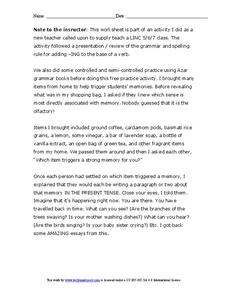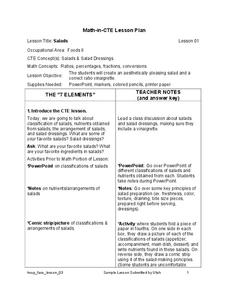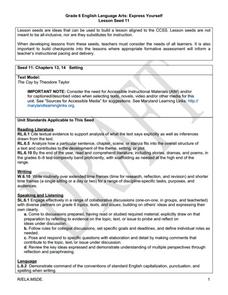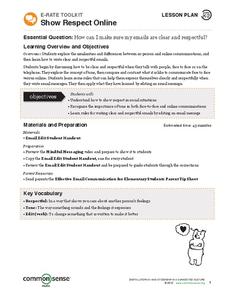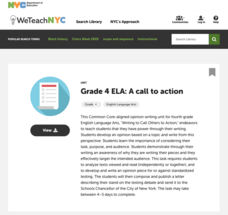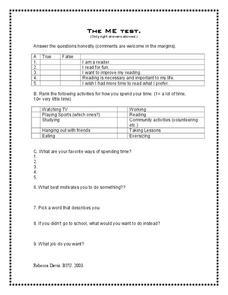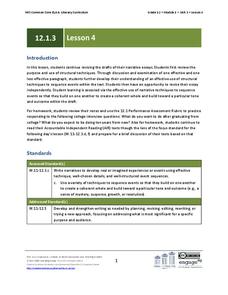Curated OER
Volcanoes: First Grade Lesson Plans and Activities
Introduce young geologists to types of volcanoes during the pre-lab. First graders explore how different liquids flow with an experiment on viscosity to simulate how different types of lava flow. Next, they learn...
California Education Partners
Eleven
It is difficult to articulate how growing up feels as accurately and beautifully as Sandra Cisneros does in her short story "Eleven." After seventh graders read the story and note the author's use of figurative language, they respond to...
National Center for Families Learning
The Summer Fun Summer Learning Poetry Unit
Focus on poetry this summer to enhance those comprehension, fluency, and language skills with a set of resources intended to explore different types of poetry, specifically lyric poetry. The daily activities contain differentiation ideas...
University of North Carolina
Speeches
A handout on speeches, part of a series on specific writing assignments, helps individuals develop their speech-writing skills. The resource starts with a discussion on audience and purpose and ends with tips to engage the audience.
Curated OER
Deciphering Word Problems in Order to Write Equations
Help young mathematicians crack the code of word problems with this three-lesson series on problem solving. Walking students step-by-step through the process of identifying key information, creating algebraic equations, and finally...
EngageNY
Reviewing Conventions and Editing Peers’ Work
Encourage young writers to edit text based on conventions. After reviewing the conventions, fourth graders watch a teacher demonstrate how to revise a paragraph for correct spelling, capitalization, punctuation, or dialogue. Then, pairs...
Curated OER
Scent-Inspired Composition
Our sense of smell has a wonderful way of bringing back memories. Unlock those memories with an olfactory-inspired writing prompt that challenges writers to tell a story about a specific smell and the memories it conjures.
National Research Center for Career and Technical Education
Salads
Lettuce talk for a moment about your culinary scholars; do they have what it takes to create a great salad? Show them the finer points of salad preparation with a career and technology lesson that combines direct instruction, creativity,...
EngageNY
Contrasting Evidence: “Games Can Make a Better World” and “Video Games Benefit Children, Study Finds”
Anecdotes, analogies, testimonies, statistics. The most powerful arguments rely on multiple types of evidence. Scholars explore the topic as they read contrasting evidence about the benefits of video games. They complete Venn diagrams to...
Curated OER
Express Yourself Lesson Seed 11: Setting
Encourage your learners to examine the setting in Theodore Taylor's The Cay. Pupils work in small groups to put together a description of the setting before reading two more chapters of the book. They use their double-entry journals to...
Curated OER
Did Napoleon Uphold or Betray the Goals of the Revolution?
Walk your learners through constructing a well-formulated argument on Napoleon's dedication to the goals of the French Revolution.
Common Sense Media
Show Respect Online
Through discussion and a variety of worksheet types, pupils learn to review their e-mails for grammar, appropriateness, and respect before sending.
New York City Department of Education
Grade 4 Literacy in English Language Arts: A Call to Action
You have the power! Scholars learn that they have power of the pen in their writing. After reading and viewing various sources about standardized testing, they express their own opinions about the testing by writing letters to the...
Curated OER
Express Yourself Lesson Seed 12: Story Event
Focus on plot and the impact-specific events in The Cay. Class members use their double-entry journals, created in a previous lesson in this series, to record their thinking about the guiding question as they read chapters 15 through 17....
Novelinks
Running Out of Time: Anticipation Guide
Get your class ready to read with this anticipatory set for Running Out of Time. Small groups each consider one thought-provoking statement. After each group comes to a consensus, the whole class participates in sharing ideas and voting...
EngageNY
Grade 9 ELA Module 3, Unit 3, Lesson 1
The opening exercise in this instructional unit introduces class members to the writing process they will follow to craft an informative, expository research paper that addresses their research question. To begin, writers are asked to...
EngageNY
Grade 9 ELA Module 4, Unit 1, Lesson 28
As writers continue to revise their argument essays, the focus shifts to editing grammatical conventions, parallel structure, and varying syntax to add interest. After examining model sentences that demonstrate sentence variety, writers...
EngageNY
End of Unit 2 Assessment, Part 1:Drafting the Argument Essay
An informative resource instructs pupils on how to write their essay drafts about the theme of control in Shakespeare's A Midsummer Night's Dream. Next, scholars complete an Exit Ticket, listing their three favorite characters from the...
K12 Reader
Narrative or Expository?
Narrative or expository? That is the question readers face on a two-part comprehension worksheet that asks kids to read a short passage about these two different types of writing, and then to answer a series of comprehension questions...
K12 Reader
Expand it! Writing Complex Sentences
Instruct your pupils to make those simple sentences complex! For this exercise, learners are given eight pairs of complete sentences and subordinating conjunctions. It's their job to transform each sentence by using the subordinating...
Spreading Gratitude Rocks
Gratitude Bank
Money isn't the only type of currency that fills a piggy bank. Learners practice filling their banks with the the things that make them grateful. Pupils write about their talents, relationships, challenges, and life skills, making...
Curated OER
The Lion, the Witch and the Wardrobe: Me Test
Get to know your scholars with this in-depth survey that asks learners to rate, answer true or false, write short answers, and draw abstract visuals about their academic and personal preferences.
EngageNY
Grade 12 ELA Module 1, Unit 3, Lesson 4
Once again, class groups examine two model paragraphs and, using the provided rubric, evaluate how effectively the writers use structural techniques to sequence events so that they build a specific tone. Individuals then use what they...
Rainforest Alliance
Knowing the Essential Elements of a Habitat
To gain insight into the many different types of habitats, individuals must first get to know their own. Here, scholars explore their school environment, draw a map, compare and contrast their surroundings to larger ones. They then...
Other popular searches
- Types of Writing
- Types of Editorial Writing
- Types of Conflict Writing
- 4 Types of Writing
- Four Types of Writing
- Different Types of Writing
- Types on Nonfiction Writing
- Types of Writing Passages
- Types of Writing Coverage






